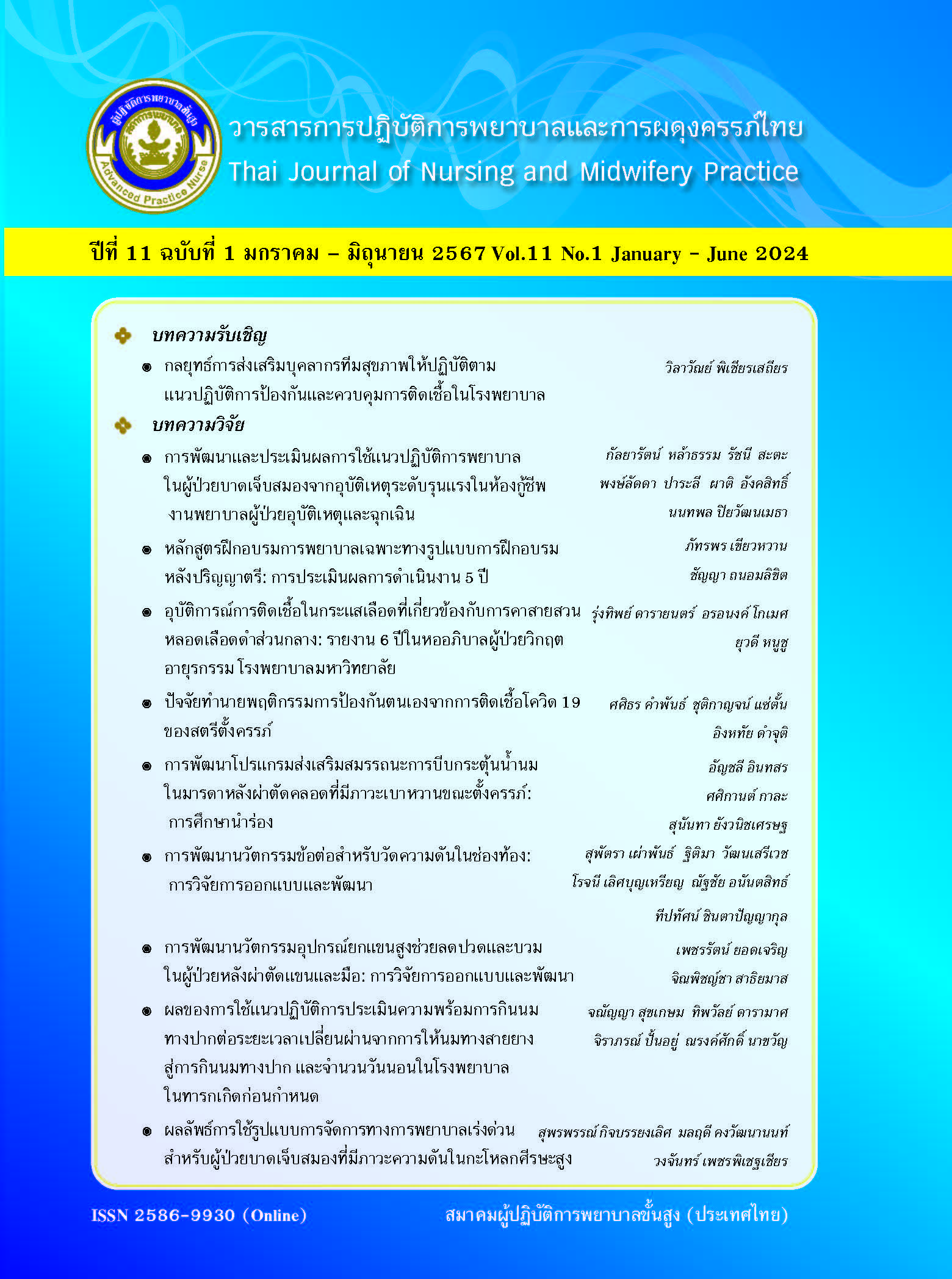Factors Predicting Covid-19 Self-Protective Behaviors among Pregnant Women
Main Article Content
Abstract
This research aimed to study self-protective behaviors against COVID-19 infection and its predictors among pregnant women. Two hundred and seventy-eight pregnant women receiving antenatal care at a Provincial Hospital in the south of Thailand were selected through simple random sampling. Data were collected using a set of questionnaires including demographics, COVID-19 preventive knowledge, perceived severity of the disease, attitudes towards self-protection, adherence to reference groups, perceived self-efficacy, and self-protective behavior against COVID-19 infection questionnaires. The instruments’ reliability was tested using Cronbach’s alpha coefficients, yielding values of 0.76, 0.90, 0.99, 0.94, 0.71, and 0.84, respectively. Statistical analysis included percentages, means, standard deviations, and stepwise multiple regression analysis. The findings revealed that 92.40% of pregnant women rated a high level of self-protective behavior against COVID-19 infection. Stepwise multiple regression analysis indicated that perceived self-efficacy and adherence to reference groups significantly predicted self-protective behavior against COVID-19 infection, accounting for 71.70% of the variance (R2 = .717, p < .001). Therefore, both factors should be included in designing programs to promote self-protection against COVID-19 in pregnant women and applying in preparedness of emerging infectious
diseases in the future.
Downloads
Article Details

This work is licensed under a Creative Commons Attribution-NonCommercial-NoDerivatives 4.0 International License.
References
Department of Disease Control. Guidelines for prevent Corona virus disease 2019 (COVID-19) or COVID-19 for general public and risk groups [Internet]. 2021 [cited 2022 Dec 21]. Available from: https://ddc.moph.go.th/viralpneumonia/file/int_protection/int_protection_030164.pdf.
Allotey J, Stallings E, Bonet M, et al. Clinical manifestations, risk factors, and maternal and perinatal outcomes of coronavirus disease 2019 in pregnancy: Living systematic review and metaanalysis. BMJ.2020; 370: m3320. doi: 10.1136/bmj.m3320.
Professional Standards Subcommittee. RTCOG clinical practice guideline management of Covid-19 infection in pregnancy version 4 [Internet]. 2020 [cited 2020 Mar 20]. Available from: https://covid19.dms.go.th/backend///Content/Content_File/Covid_Health/Attach/ 25630324214133PM_CPG-Covid-Preg-20Mar 20.pdf.
Department of Health. Situation report corona virus 2019 (COVID-19) [Internet]. 2022 [cited 2022 Jan 20]. Available from: https://ddc.moph.go.th/Covid 19 - dashboard.
Professional Standards Subcommittee. RTCOG Clinical practice guideline management of Covid-19 infection in pregnancy version 5 [Internet]. 2022 [cited 2022 Jan 22]. Available from: https://www.thainapci.org/2021/wp-content/uploads/2021/05/CPG-Covid-Preg-V5-21May21-edit-24May21.pdf.
Khumsaen N. Knowledge, attitudes, preventive behaviors of COVID-19 among people living in amphoe U-thong, Suphanburi province. JPCN. 2020; 4(1): 33-48. Thai.
Damaris A, Jason E, Strickhouser A, et al. Prevention behaviors during the COVID-19 pandemic: Associations with perceived behavioral control, attitudes, and subjective norm. Frontiers: Public Health; 2021.
Khazaeian S, Khazaeian S, Kazemi A. Pregnant women’s knowledge, perceived severity and perceived controllability of the COVID-19 and their associations with emotional and behavioral reactions: A cross-sectional study. 2021; 1-21. doi: 10.21203/rs.3rs-132425/v1.
Thato R. Nursing research: Concepts to application. 3th ed. Bangkok: Chulalongkorn university Printing; 2018. Thai.
Bloom S, Madaus F, Hastings T. Handbook on formative and summative evaluation of student learning. New York: Mc Graw-Hill; 1971.
Best JW. Research in education. 3rd ed. Englewood Cliffs. New Jersey: Prentice Hall; 1977.
Hair JF, Black WC, Babin BJ, et al. Multivariate data analysis. 7th ed. New Jersey: Pearson Education; 2010.
Limsringam P, Sasithanakornkaew S, Apisupachoke W. Information perception concerning novel coronavirus (COVID-19) through social media on the attitudes and preventive behaviors of citizens in Bangkok. JMND. 2021; 8(9): 18-33. Thai.
Morasakul B, Punthasee P. Knowledge and prevention behaviors regarding COVID-19 among the first-year nursing students of Saint Theresa International College and Saint Louis College. RHPC9 Journal. 2021; 15(37): 179-95. Thai.
Klomjai T, Kaewjaiboon J, Chatchawarat T. Knowledge and prevention behavior of Coronavirus disease 2019. Nursing Public Health and Education Journal. 2021; 21(2): 29-39. Thai.
Ajzen I. The theory of planned behavior. Organizational behavior and human decision processes. 1991; 50(2): 179-202.
Bandura A. Self-efficacy: The exercise of control. New York: W.H. Freeman and company; 1997.
Cheypho K. A study of the factors influencing metabolic syndrome preventive behaviors applying the theory of planned behavior working adults 21-35 years of age in Bangkok, Thailand: Thammasat University; 2016. Thai.
Tepsuriyanont S. A causal model of medication adherence behavior among hypertensive adult patients. JONAE. 2017; 10(1): 1-16. Thai.
Wisarutkasemphong A, Muangpool S. Factors related to the intention to repeat pregnancy among pregnant adolescents. Srinagarind Med J. 2018; 30(3): 262-69. Thai.
Kaewjaiboon J, Pechkwang D, Kawila T, Punwong V, Junsuk k. Factors related to COVID-19 infection prevention behavior among pregnant women. J.H.Nsg.Edu. 2023; 29(2): 1-15.
Chansiri S, Phahuwatanakone W, Yusamran C. Influences of breastfeeding attitude, subjective norm, and self-efficacy on intention to exclusive breastfeeding among teenage pregnant women. Nurs Sci J Thai. 2017; 35(4): 49-60. Thai.
Kruangkaew P, Phahuwatanakorn W, Pungbangkadee R. Predictability of knowledge, attitude, subjective norm and perceived behavioral control on intention to the use of long-acting reversible contraception among primipara pregnant adolescents.
Nurs Sci J Thai. 2021; 39(1): 64-76. Thai.


